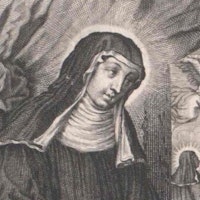God hugs you. You are encircled by the arms of the mystery of God.
Mother of All
Topic: Divine Love & Goodness
Good people,
Most royal greening verdancy.
Rooted in the sun,
You shine with radiant light.
In this circle of earthly existence
You shine so finely,
It surpasses understanding.
God hugs you,
You are encircled by the arms
Of the mystery of God.
Hildegard of Bingen (1098-1179) was a Benedictine abbess and mystic of medieval Germany. She was born into a noble family in Bermersheim vor der Höhe, Germany, and entered religious life at the age of eight. She received a rudimentary education, but at the age of forty-two, she began to experience a series of visions that would shape her life and work.
Hildegard described these visions as "the living light," and they were often accompanied by physical sensations such as heat, cold, and pain. She believed that these visions were a gift from God, and she felt called to share them with the world. She began to write down her visions, and she also composed music and poetry to express her spiritual insights.
Hildegard was a prolific writer, and her works cover a wide range of topics, including theology, natural science, medicine, and music. She is best known for her three volumes of visionary theology: Scivias, Liber Vitae Meritorum, and Liber Divinorum Operum. These works are rich in symbolism and imagery, and they offer a unique perspective on the nature of God, the human soul, and the world.
In addition to her writings, Hildegard was also a gifted musician and composer. She wrote over 70 songs, including the Ordo Virtutum, an early example of liturgical drama. Her music is characterized by its simple melodies and its use of plainchant.
Hildegard was a complex and multifaceted figure, and her work continues to inspire and challenge people today. She was a visionary, a mystic, a writer, a composer, a scientist, and a healer. She was also a woman of great courage and determination, and she used her gifts to make a difference in the world.
Hildegard of Bingen was a remarkable woman who left a lasting legacy. She was a pioneer in the fields of theology, natural science, and music, and her work continues to be studied and appreciated today. She was also a powerful voice for women's rights, and she challenged the patriarchal structures of her time. Hildegard of Bingen was a true visionary, and she continues to inspire us with her courage, her intellect, and her creativity.
Book of Divine Works
Hildegard of Bingen. Book of Divine Works, translated by Matthew Fox, Bear & Company, 2001, p. 185.

Hildegard of Bingen
Theme: Divine Father and Mother


About This Hildegard of Bingen Quote [Commentary]
Hildegard of Bingen’s words, “God hugs you. You are encircled by the arms of the mystery of God,” evoke the tender love of Mother God, emphasizing the nurturing and intimate aspects of divine care. Hildegard, a 12th-century mystic and abbess, saw God as deeply engaged in human lives, surrounding each person with love and mystery. This image of God’s embrace reflects the maternal quality of divine love, offering comfort and reassurance while inviting trust in this ever-present care.
In this passage, Hildegard highlights the creative and sustaining aspects of God’s love, describing humanity as “rooted in the sun” and shining with “radiant light.” This imagery suggests the life-giving presence of Mother God, who nurtures creation much like a mother tending to her child’s growth. The “arms of the mystery of God” symbolize safety and sustenance, reminding us that divine love supports and uplifts at all times. Hildegard’s vision speaks to the closeness of God, whose care for humanity transcends comprehension but is always deeply felt.
Hildegard’s portrayal of God as embracing humanity with maternal tenderness invites a deeper understanding of divine love. Rather than being distant or abstract, Mother God’s love encircles, nurtures, and protects. Through this tender act of hugging, Hildegard reminds us that God’s love is meant to be experienced with our inner heart’s understanding, offering comfort and strength. Her words encourage us to trust in this maternal embrace, knowing we are always held within the boundless care of Mother God.
Joan Chittister’s Commentary On Hildegard of Bingen’s Poem
“It may not be official theological language but it should be. “God hugs you” says it all: When we’re tired, depressed, exhausted from working so hard, full of satisfaction with today but concerned about tomorrow, God hugs you. What else is there to say?”
—Joan Chittister, https://redmountainjournal.com/god-hugs-you/ (Accessed 11/13/24.)
Hildegard of Bingen’s Vision About the Divine Feminine
“I heard a voice speaking to me: ‘The young woman whom you see is Love. She has her tent in eternity… It was love which was the source of this creation in the beginning when God said: ‘Let it be!’ And it was. As though in the blinking of an eye, the whole creation was formed through love. The young woman is radiant in such a clear, lightning-like brilliance of countenance that you can’t fully look at her… She holds the sun and moon in her right hand and embraces them tenderly… The whole of creation calls this maiden ‘Lady.’ For it was from her that all of creation proceeded, since Love was the first. She made everything… Love was in eternity and brought forth, in the beginning of all holiness, all creatures without any admixture of evil. Adam and Eve, as well were produced by love from the pure nature of the Earth.”
—Adapted from Matthew Fox, Hildegard of Bingen: A Saint For Our Times, pp. xiii, xiv, xvi.
Resources
Related Quotes
Copyright © 2017 – 2026 LuminaryQuotes.com About Us